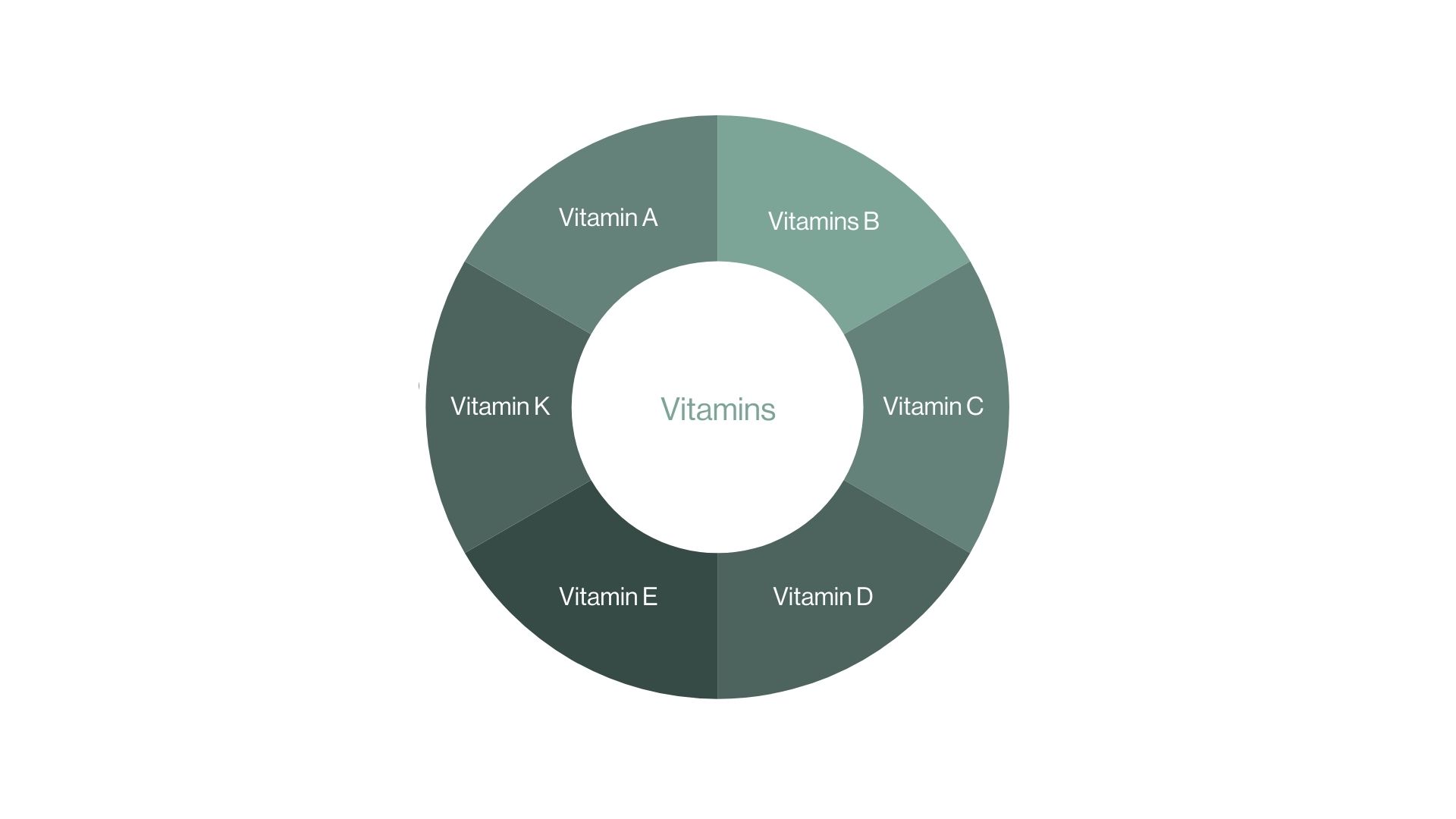Vitamins are necessary to live, as they contribute to the proper functioning of all the biochemical functions of our metabolism. The word vitamin comes from the Latin "vita (life)" and the suffix "amine", because when this group of molecules was named, it was thought that they all contained an amino chemical group.
But what is a vitamin? On a chemical level, it is considered to be an organic substance that occurs naturally in small amounts in certain foods and which is essential for our body's functions. However, vitamins are not synthesised in adequate quantities. For example, vitamin B3, or niacin, is considered a vitamin because, although we can synthesise it from tryptophan, the synthesis is very inefficient. The same applies to vitamin D, which can be synthesised through sun exposure in adequate amounts, but if there is little sun exposure, it must be incorporated into our diet.
Indispensable Vitamins: Functions and Benefits
There are a total of 13 vitamins, which can be classified according to different criteria. With regard to solubility, there are two main groups: fat-soluble vitamins (soluble in fats and oils and which can be accumulated in our bodies) and water-soluble vitamins (soluble in water and which cannot be accumulated in our bodies).
The fat-soluble vitamins are vitamins A, D, E, and K, while the other nine vitamins are water-soluble, such as vitamin C and B vitamins.
|
Did you know…? Vitamers are the different chemical forms of a vitamin, which have the same function but may have, for example, a different potency. In the case of vitamin A, its vitamers are retinol, retinal, and retinoic acid. . |

Vitamin A
Vitamin A can be obtained from beta-carotene, carrots and green leafy vegetables. However, vitamin A as such can only be found in foods of animal origin. However, we should also remember that food supplements containing vitamin A are also available.
The main functions of vitamin A include:
- Eye health, as this vitamin forms part of the structure of light-detecting pigments.
- Regulation of gene expression, such as those involved in growth.
- Strengthening the immune system and bone health.
- Embryonic development support.
Vitamin A vitamers are retinoic acid, retinol, and retinal.
The recommended daily dose of this vitamin varies according to age and gender, but the average dose in adults is around 800 μg/day, being higher during pregnancy or while breastfeeding [1].
B Vitamins
This group has 8 subtypes of B vitamins. Here is a summary outlining the most important facts about each of them:
Vitamin B1 (Thiamine):
- Function: Carbohydrate metabolism. It is also vital for the nervous system.
- Sources: Yeast, liver, whole grains, microbiota, and B vitamin food supplements, such as B vitamin complexes.
- Recommended Dose: 1.15 mg/day for adults, higher during pregnancy/lactation [2].
Vitamin B2 (Riboflavin):
- Function: Produces energy and improves the health of skin, nails, hair, and mucous membranes.
- Sources: Liver, dairy products, meats, eggs, green leafy vegetables, and B vitamin food supplements, such as B vitamin complexes.
- Recommended Dose: 1.2 mg/day for adults, higher during pregnancy/lactation [3].
Vitamin B3 (Niacin):
- Function: Improves hair strength, and is important for energy metabolism.
- Sources: Brewer's yeast, meat and, B vitamin food supplements, such as B vitamin complexes.
- It has two vitamers: Nicotinic acid and nicotinamide.
- Recommended Dose: 15 mg/day for adults, higher during pregnancy/lactation [4].
Vitamin B5 (Pantothenic Acid):
- Function: Helps skin regeneration, it also synthesises fatty acids and hormones.
- Sources: Meats (liver, heart), whole grains, royal jelly, and B vitamin food supplements, such as B vitamin complexes.
- Recommended Dose: 5 mg/day for adults, higher during pregnancy/lactation [5].
Vitamin B6:
- Function: Important for amino acid and protein metabolism.
- Sources: Meats, cereals, vegetables, nuts and, B vitamin food supplements, such as B vitamin complexes.
- It has four vitamers: Pyridoxine, pyridoxal, pyridoxamine, and pyridoxic acid.
- Recommended dose: 1.3 mg/day for adults, higher for people over the age of 51 and during pregnancy/lactation [6].
Vitamin B7 (Biotin):
- Function: Involved in carboxylation reactions and skin, hair, and nail care.
- Sources: Milk, liver, eggs, whole grains, and nutricosmetic supplements, such as biotin complexes.
- Recommended dose: 30 μg/day for adults, higher during lactation [7].
Vitamin B9 (folate):
- Function: Involved in DNA synthesis.
- Sources: Liver, legumes, vegetables, and B vitamin food supplements, such as B vitamin complexes.
- Recommended dose: 400 μg/day for adults, higher during pregnancy/lactation [8].
Vitamin B12:
- Function: Essential for neuronal health and red blood cell formation.
- Sources: Fermented foods, animal-origin foods and vitamin B12 food supplements - the only source of vitamin B12 for people following a plant-based diet.
- Recommended dose: 2.4 μg/day for adults, higher during pregnancy/lactation [9].
Vitamin C
Vitamin C is also called ascorbic acid. The best sources of this vitamin are fruits and vegetables. Vitamin C is thermolabile, meaning, part of it degrades when heated or cooked. That is why it is preferable to obtain this vitamin from fruits, as they are mainly eaten raw. It can also be obtained from vitamin C supplements, such as vitamin C, and vitamin C together with zinc or liposomal vitamin C.
Its main functions are:
- Promote the synthesis and production of collagen, stabilising collagen fibres.
- Contribute to the synthesis of hormones such as adrenaline and noradrenaline.
- Take part in other reactions, such as carnitine synthesis, detoxifying medicines, or breaking down the amino acid tyrosine.
It also increases iron bioavailability and boosts the immune system by strengthening the function of our body's defence cells.
Finally, it has an antioxidant action, therefore it helps to neutralise free radicals, together with vitamin E.
The recommended daily dose of vitamin C varies according to age, but the average dose for adults is around 85 mg/day and is higher during lactation [10].
Vitamin D
Food sources rich in vitamin D include fish oils, eggs, butter, and liver. In addition, many foods are enriched with vitamin D, such as milk. This vitamin is also known as the "sunshine vitamin" because the amount we can obtain from food is very small, so we get it mainly through our skin and sun exposure. A useful recommendation is to sunbathe for about 20 minutes each day during the hours of minimum exposure. Vitamin D can also be found in food supplements, such as vitamin D3.
It has important functions such as:
- Calcium homeostasis, meaning, it is responsible for ensuring that blood calcium levels are constant under all circumstances through hormonal control.
- It is also important for our immune system's health and muscle function.
This vitamin has two vitamers, vitamin D2 (ergocalciferol) and vitamin D3 (cholecalciferol).
The recommended daily dose of vitamin D varies according to age, but the average dose for adults is around 15 μg/day, higher for adults over the age of 71 [11].
Vitamin E
The main food sources of vitamin E are wheat germ, vegetable oils, seeds, and cereal grains. It is also found in vitamin E supplements, in the form of one or both of its vitamers.
Its main functions are:
- Antioxidant function: Helps eliminate free radicals, either alone or combined with vitamin C.
- Photoprotective effect and helps to increase skin hydration.
- Strengthening the immune system.
It has two vitamers, tocopherols and tocotrienols.
The recommended daily dose of vitamin E varies according to age, but the average dose in adults is around 15 mg/day and is higher during lactation [12].
Vitamin K
Foods rich in vitamin K are those of vegetable origin (green leafy vegetables) and meats such as liver. The most abundant source of the vitamin in nature is royal jelly. In addition, our intestinal microbiota can also synthesise vitamin K. It can also be found in vitamin K supplements, often vitamin K together with vitamin D3.
The two most important functions of this vitamin in our body are:
- Involvement in the coagulation process, as some coagulation factors depend on this vitamin.
- Involvement in bone homeostasis together with calcium.
There are four vitamers: phylloquinones, phylloquinone epoxides, menaquinones, and menadiones (synthetic).
The recommended daily dose of vitamin K varies according to age and gender, but the average dose for adults is around 100 μg/day, slightly higher in adult men [13].
Below, you will find a table summarising the most important information about each of the vitamins mentioned above:
As you have seen, vitamins are essential nutrients that play a fundamental role in our health and well-being and are great allies on our path to a healthier life. So, incorporate vitamin-rich foods into your diet and enjoy the long-term health benefits.
References:
[1] Vitamin A and Carotenoids - Consumer (nih.gov)
[2] Thiamin - Consumer (nih.gov)
[3] Riboflavin - Consumer (nih.gov)
[4] Niacin - Consumer (nih.gov)
[5] Pantothenic Acid - Consumer (nih.gov)
[6] Vitamin B6 - Consumer (nih.gov)
[7] Biotin - Consumer (nih.gov)
[8] Folate - Consumer (nih.gov)
[9] Vitamin B12 - Consumer (nih.gov)
[10] Vitamin C - Consumer (nih.gov)
[11] Vitamin D - Consumer (nih.gov)
[12] Vitamin E - Consumer (nih.gov)
[13] Vitamin K - Consumer (nih.gov)


